Summary of Findings
The political debate over the Iraq war has grown more pointed in recent weeks, as President Bush has embarked upon a series of high-profile speeches defending the war and Democratic Rep. John Murtha has made headlines with his calls for a withdrawal of U.S. forces. But fundamental public attitudes toward the war have not been changed in either direction by the clashing points of view. Pew’s latest national survey shows that the public continues to be evenly divided about whether to withdraw U.S. forces as soon as possible or keep them in Iraq until the country is stabilized, as well as over the decision to take military action in Iraq.
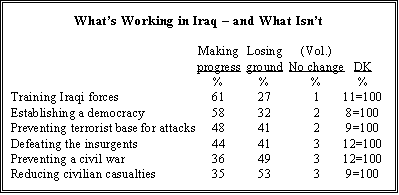 Americans also have a mixed view of conditions on the ground in Iraq. Fully 61% of the public believes that progress is being made in training Iraqi forces, while nearly as many (58%) say the same about establishing a democracy in Iraq.
Americans also have a mixed view of conditions on the ground in Iraq. Fully 61% of the public believes that progress is being made in training Iraqi forces, while nearly as many (58%) say the same about establishing a democracy in Iraq.
However, a 53% majority believes the U.S. is losing ground in reducing the number of civilian casualties in Iraq. Similarly, the public by 49%-36% believes that the U.S. is not succeeding in preventing a civil war between Iraq’s ethnic and religious groups. There also is a close division of opinion about whether the U.S. is gaining or losing ground in defeating the insurgents militarily (44% making progress/41% losing ground).
The latest nationwide poll by the Pew Research Center for the People & the Press, conducted among 1,502 adults from Dec. 7-11, finds the public is modestly optimistic that the Dec. 15 parliamentary elections will lead to greater stability in Iraq. About one-in-five (22%) say they have heard a lot about the elections, while 57% have heard a little. That is slightly greater than attention to Iraq’s constitutional referendum in October (21% a lot/50% a little), but well below the widespread attention to Iraq’s historic elections last January (46% a lot/40% a little).
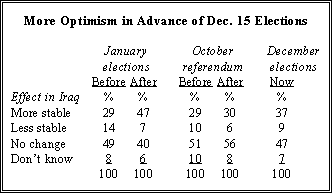 Yet somewhat more Americans now say that the elections could lead to a more stable situation in the country than did so prior to previous rounds of balloting in October and January. Roughly four-in-ten Americans (37%) say the parliamentary elections will lead to a more stable situation in the country. That is significantly greater than the percentages predicting that previous votes in Iraq in October and last January would lead to a more stable situation in the country (29% each). However, a 47% plurality believes that the situation in Iraq will not change much as a result of the election.
Yet somewhat more Americans now say that the elections could lead to a more stable situation in the country than did so prior to previous rounds of balloting in October and January. Roughly four-in-ten Americans (37%) say the parliamentary elections will lead to a more stable situation in the country. That is significantly greater than the percentages predicting that previous votes in Iraq in October and last January would lead to a more stable situation in the country (29% each). However, a 47% plurality believes that the situation in Iraq will not change much as a result of the election.
As in recent surveys, however, most Americans (56%) favor setting a timetable for removing U.S. troops. Yet the public is wary about the consequences of a quick withdrawal. A solid majority (58%) believes that terrorist organizations in Iraq will become stronger if the United States withdraws its forces soon; 22% say terrorists would not be affected; just 13% feel a U.S. withdrawal would weaken terrorist organizations.
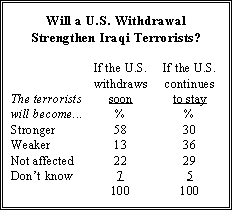 By contrast, the public is divided over what effect the continued presence of U.S. forces would have on the strength of terrorist organizations in Iraq. More than a third (36%) say keeping troops in Iraq will weaken terrorist groups there, while 30% say it will strengthen the terrorists, and 29% believe it will have no impact.
By contrast, the public is divided over what effect the continued presence of U.S. forces would have on the strength of terrorist organizations in Iraq. More than a third (36%) say keeping troops in Iraq will weaken terrorist groups there, while 30% say it will strengthen the terrorists, and 29% believe it will have no impact.
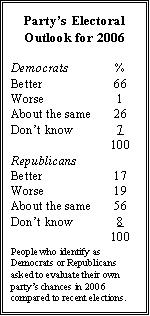 The new survey shows that President Bush’s job approval ratings have not improved, despite a brighter national economic picture and his renewed efforts to build public confidence in the war; 38% approve of his job performance, which is little changed from November (36%).
The new survey shows that President Bush’s job approval ratings have not improved, despite a brighter national economic picture and his renewed efforts to build public confidence in the war; 38% approve of his job performance, which is little changed from November (36%).
The upcoming launch of the new Medicare prescription drug benefit is drawing a mixed response. Two years ago, the public approved of the new Medicare law by roughly two-to-one (55%-27%); today, 48% approve of the changes in prescription drug coverage while 30% are opposed. And far more people express negative reactions than positive ones to the new program, with many Americans critical of the plan’s complexity and expense.
The survey shows that Democrats are highly optimistic about their party’s prospects in next year’s congressional midterm elections. Fully two-thirds of Democrats (66%) say they think their party will do better in 2006 than it has in recent elections just 1% see the Democratic Party doing worse than usual next year. By comparison, only 17% of Republicans predict that the GOP’s position will improve in the coming election 20% think their party will do worse than it has recently, and 55% believe things will stay about the same.
What Should the U.S. Do Now?
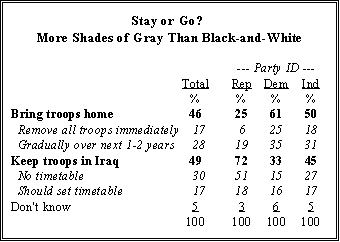 The roughly even division in the public over whether to keep troops in Iraq obscures a more complicated set of opinions about what to do next. Most of those who want to bring troops home “as soon as possible” apparently do not mean “now,” and not everyone who wants the U.S. to stay in Iraq is opposed to setting a timetable for withdrawal.
The roughly even division in the public over whether to keep troops in Iraq obscures a more complicated set of opinions about what to do next. Most of those who want to bring troops home “as soon as possible” apparently do not mean “now,” and not everyone who wants the U.S. to stay in Iraq is opposed to setting a timetable for withdrawal.
Of those who support bringing the troops home, most favor a gradual withdrawal over the next one to two years rather than an abrupt departure. Even among liberal Democrats, 66% of whom favor disengagement, most believe this withdrawal should be gradual (40% favor gradual withdrawal, 24% think it should occur immediately). Within every partisan group across the spectrum, support for bringing troops home is more likely to mean gradual rather than immediate withdrawal.
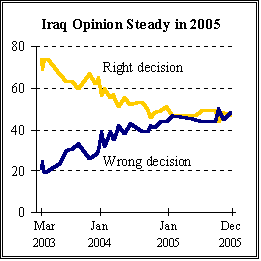 Many of those who favor keeping troops in Iraq until a stable situation is created nonetheless favor the establishment of a timetable for withdrawal. Among the public overall, 49% favor keeping troops in Iraq but just 30% take this position and reject a timetable for withdrawal. Democrats who believe the U.S. should remain in Iraq are divided evenly between those who favor and those who oppose a timetable. Even among Republicans, just half (51%) take the position of the administration that the U.S. should keep troops in Iraq, with no timetable, until a stable situation is established.
Many of those who favor keeping troops in Iraq until a stable situation is created nonetheless favor the establishment of a timetable for withdrawal. Among the public overall, 49% favor keeping troops in Iraq but just 30% take this position and reject a timetable for withdrawal. Democrats who believe the U.S. should remain in Iraq are divided evenly between those who favor and those who oppose a timetable. Even among Republicans, just half (51%) take the position of the administration that the U.S. should keep troops in Iraq, with no timetable, until a stable situation is established.
Most Iraq Views Stable
For the most part, public sentiment about the decision to invade Iraq has changed little over the course of 2005. About half (47%) say the decision to use military force was right, while about as many feel it was wrong (48%).
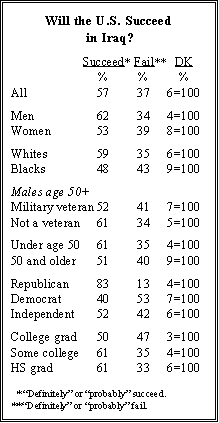 Most of those who believe it was the wrong decision say they feel that way because the U.S. should not have gone to war in the first place. Relatively few say their judgment is based on events since the invasion occurred.
Most of those who believe it was the wrong decision say they feel that way because the U.S. should not have gone to war in the first place. Relatively few say their judgment is based on events since the invasion occurred.
As in previous surveys, a majority of Americans (57%) feel the United States will either definitely (16% ) or probably (41%) succeed in establishing a stable democratic government in Iraq. There are substantial political and demographic differences in opinions about prospects for success in Iraq.
However, even among groups that are largely opposed to the decision to go to war, sizable minorities say the U.S. will still succeed in Iraq. Fully 40% of Democrats and nearly half of African Americans (48%) say the U.S. will definitely or probably succeed in establishing a stable democracy in Iraq.
More men (62%) than women (53%) expect success, and Americans under age 50 (61%) are more optimistic than those 50 and older (51% think the U.S. will succeed). Fewer college educated respondents than those with less education expect the U.S. to succeed in Iraq.
A Partisan Lens on the War
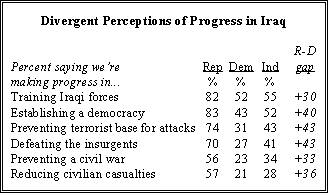 Republicans and Democrats also have very different perspectives on how the war is going. Republicans are more than twice as likely as Democrats to believe that the U.S. military effort in Iraq is going at least “fairly well”
Republicans and Democrats also have very different perspectives on how the war is going. Republicans are more than twice as likely as Democrats to believe that the U.S. military effort in Iraq is going at least “fairly well”
(78% for Republicans, 32% for Democrats). Independents (47%) are closer to Democrats than to Republicans in their assessment of how the war is going.
There are similar gaps between Democrats and Republicans on the six specific areas of progress asked about in the survey. Majorities of Republicans believe that the U.S. is making progress, rather than losing ground, in each of the six areas. By contrast, in only one of the areas do as many as half of Democrats agree (52% of Democrats say the U.S. is making progress in training Iraqi forces). The views of independents are much more similar to the Democrats than to the Republicans in the poll.
 The President and Iraq
The President and Iraq
President Bush delivered the first two of four major speeches outlining a “plan for victory” in Iraq prior to this survey, but the addresses failed to turn around the general perception that the president lacks a clear plan for bringing the situation to a successful conclusion. Fewer than three-in-ten (28%) say Bush has a clear plan, while two-thirds say he does not.
Another part of the president’s argument to the nation that the media portrays an overly negative picture of events in Iraq does find support from a significant proportion of the public (39%).
However, the same number say that the press makes the U.S. economy seem worse than it really is. Perceptions of press coverage in both areas are quite partisan.
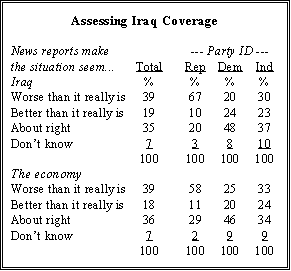 Skepticism about the press is greatest and growing among Republicans. Today, two-thirds of Republicans (67%) say the press makes the situation in Iraq seem worse than it really is, up from 57% in September. By contrast, pluralities of Democrats (48%) and independents (37%) say news reports about Iraq show the situation about the way it really is. There is a sizable, though somewhat smaller, partisan gap in perceptions of coverage of the economy.
Skepticism about the press is greatest and growing among Republicans. Today, two-thirds of Republicans (67%) say the press makes the situation in Iraq seem worse than it really is, up from 57% in September. By contrast, pluralities of Democrats (48%) and independents (37%) say news reports about Iraq show the situation about the way it really is. There is a sizable, though somewhat smaller, partisan gap in perceptions of coverage of the economy.
Bush Job Approval
While Bush’s overall job rating has held steady in recent months, it is down by 12 percentage points since the beginning of the year. The president also continues to receive generally negative ratings for his handling of both the situation in Iraq (36% approve, 58% disapprove) and the nation’s economy (38% approve, 55% disapprove).
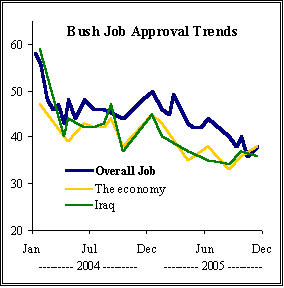 And while roughly half (49%) continue to approve of how Bush has handled terrorist threats, 44% disapprove, the highest measured in any previous Pew survey.
And while roughly half (49%) continue to approve of how Bush has handled terrorist threats, 44% disapprove, the highest measured in any previous Pew survey.
Evaluations of Bush’s overall job performance are roughly equal to his ratings on the economy and Iraq, suggesting that favorable personal evaluations and the issue of terrorism are not counterbalancing these more problematic areas in the public’s broader assessment of his performance. Throughout the past year, the president’s overall job approval rating has been significantly higher by anywhere from three to nine points than his rating on the economy and Iraq specifically. Today the president’s overall rating is identical to his rating on the economy and just two points above evaluations of his handling of Iraq. While significantly more approve of Bush’s performance when it comes to terrorist threats, this apparently no longer lifts his overall approval rating as it did earlier in the year.
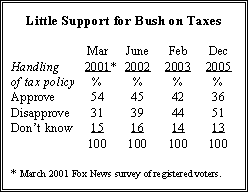 And while legislation now before Congress would extend Bush’s tax cuts into the future, about half of Americans (51%) disapprove of how the president has handled tax policy. This is a striking turnaround from Bush’s first term in office. Shortly after his first inauguration, a Fox News survey found 54% of registered voters approving of the president’s handling of taxes; this fell to 45% by June of 2002, and stands at just 36% today.
And while legislation now before Congress would extend Bush’s tax cuts into the future, about half of Americans (51%) disapprove of how the president has handled tax policy. This is a striking turnaround from Bush’s first term in office. Shortly after his first inauguration, a Fox News survey found 54% of registered voters approving of the president’s handling of taxes; this fell to 45% by June of 2002, and stands at just 36% today.
Medicare Drug Plan Favored
By a 48%-30% margin, more approve than disapprove of the new Medicare prescription drug plan, which is set to go into effect in January 2006. But positive opinion of the program has slipped slightly since passage of the law two years ago, when 55% approved in December 2003.
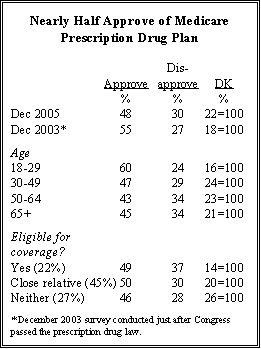 Pluralities in all age groups favor the plan, with the strongest support coming from younger people. Among senior citizens, 45% approve and a third (34%) disapprove of the Medicare drug program, views which are largely unchanged from two years ago. By comparison, people age 18-29 continue to approve of the plan by more than two-to-one (60%-24%).
Pluralities in all age groups favor the plan, with the strongest support coming from younger people. Among senior citizens, 45% approve and a third (34%) disapprove of the Medicare drug program, views which are largely unchanged from two years ago. By comparison, people age 18-29 continue to approve of the plan by more than two-to-one (60%-24%).
The decline in support since 2003 has been most notable among people ages 30-64. When the bill was first passed, people in this age range were much more supportive than were those ages 65 and older. But today, there is no significant difference between those ages 30-64 and senior citizens. The sharp political divide over the Medicare prescription drug plan in 2003 has dissipated somewhat.
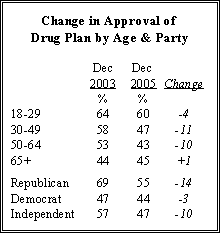 Republicans continue to be the most supportive of the Medicare prescription drug plan (55% approve), although their approval level is down 14 points from two years ago. Support among independents is also down from 57% in 2003 to 47% today, while the views of Democrats are relatively unchanged.
Republicans continue to be the most supportive of the Medicare prescription drug plan (55% approve), although their approval level is down 14 points from two years ago. Support among independents is also down from 57% in 2003 to 47% today, while the views of Democrats are relatively unchanged.
Roughly one-in-five Americans (22%) say they are eligible for the new Medicare program. Those who are experiencing the program firsthand are more likely to express disapproval of the drug plan (37%). Still, about half of eligible Americans approve of the changes to Medicare, which is no lower than in the public overall.
Personal Reactions to the Medicare Change
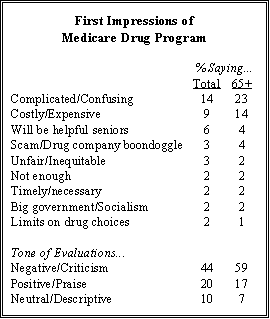 While more approve than disapprove of the new Medicare drug program, people volunteer criticism more frequently than praise when asked to describe their first impression of the program in their own words. The two problems cited most frequently are that the new program is complicated (mentioned by 14% of Americans) and that it will be costly for both seniors and the government (9%). Overall, by roughly two-to-one (44% vs. 20%) people are more likely cite negative than positive aspects of the program when describing it in their own words.
While more approve than disapprove of the new Medicare drug program, people volunteer criticism more frequently than praise when asked to describe their first impression of the program in their own words. The two problems cited most frequently are that the new program is complicated (mentioned by 14% of Americans) and that it will be costly for both seniors and the government (9%). Overall, by roughly two-to-one (44% vs. 20%) people are more likely cite negative than positive aspects of the program when describing it in their own words.
These negative reactions are even more prevalent among seniors, fully 59% of whom offer criticism when describing their first impression of the program. Nearly a quarter of seniors (23%) describe the new system as complicated and confusing, and 14% express concerns about the cost of the program.
Even many who approve of the new Medicare law offer negative descriptions when asked what first comes to mind. In many cases, these criticisms from supporters are of a practical nature for example, that the system is confusing. Other supporters suggest that it does not do enough for people yet. But most people who approve of the program give favorable descriptions, such as that it will help seniors afford prescription drug costs, and that is a needed step for the government to take.
Who Is Helped and Hurt
On balance, most Americans say the prescription drug plan will be good for seniors on Medicare; 53% feel it will be good, while 30% say it will be bad.
However, even more Americans (58%) feel drug companies will benefit from the new program.
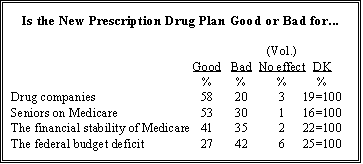 The public is much less optimistic about the new plan’s impact on the federal budget deficit. About four-in-ten (42%) think that the prescription drug plan will be bad for the deficit, while only about a quarter (27%) think it will be good. Opinions are more divided over the drug plan’s impact on Medicare’s financial stability, with about four-in-ten (41%) thinking it will be good compared with 35% saying it will be bad.
The public is much less optimistic about the new plan’s impact on the federal budget deficit. About four-in-ten (42%) think that the prescription drug plan will be bad for the deficit, while only about a quarter (27%) think it will be good. Opinions are more divided over the drug plan’s impact on Medicare’s financial stability, with about four-in-ten (41%) thinking it will be good compared with 35% saying it will be bad.
In evaluating the costs of the new program, seniors express more concern about the plan’s broader impact on the budget deficit and the long term stability of Medicare than they do about its effect on seniors directly. Just 27% of Americans 65 and older say they new system will be bad for seniors on Medicare, but 53% say it will be bad for the deficit and 41% say it will hurt Medicare’s finances. Young people, by comparison, worry far less about these economic issues. Just 37% of people age 18-29 see the new plan as bad for the deficit, and 28% see it hurting Medicare’s finances.
Alito Overshadowed
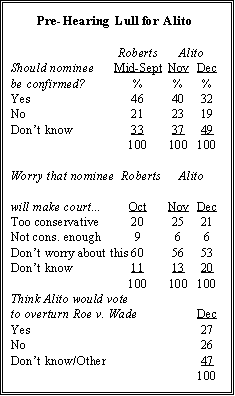 With the Senate gearing up for confirmation hearings next month for Samuel Alito, President Bush’s choice for the Supreme Court, public attention to the nomination has faded. Only about a third of Americans (34%) are following Alito’s nomination closely, with just 14% following it very closely. In early November, 49% were paying at least some attention, with 21% following the issue very closely.
With the Senate gearing up for confirmation hearings next month for Samuel Alito, President Bush’s choice for the Supreme Court, public attention to the nomination has faded. Only about a third of Americans (34%) are following Alito’s nomination closely, with just 14% following it very closely. In early November, 49% were paying at least some attention, with 21% following the issue very closely.
Fewer Americans also are offering an opinion about the nomination. Currently, 32% favor Alito’s confirmation while 19% are opposed, with 49% expressing no opinion. In November, 40% favored Alito’s nomination and 23% were opposed, with 37% expressing no opinion.
The public is evenly divided over whether they believe that if Alito is confirmed he would vote to overturn the Roe v. Wade decision establishing a woman’s right to an abortion. Democrats, by 37%-22%, feel Alito would vote to overturn Roe; Republicans, by a comparable margin (32%-17%), disagree.
Gas Prices Still Top News Story
The price of gas is well below its level of a few months ago, but the public remains highly attentive to gas prices. About six-in-ten (61%) say they are paying very close attention to news about the high price of gas, unchanged from last month. Public interest in high gas prices reached an all-time high in early September (71% very closely), as prices spiraled in the aftermath of Hurricane Katrina.
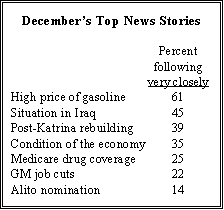 More than four-in-ten Americans (45%) are tracking overall developments in Iraq very closely, the highest level of interest since January. By contrast, public interest in Hurricane Katrina has declined markedly since the storm hit the Gulf Coast at the end of August. Currently, 39% say they are paying very close attention to news reports on rebuilding in areas affected by Katrina. That compares with 70% who tracked news of the hurricane very closely in early September, and 73% who paid very close attention to the impact of Hurricanes Rita and Katrina in early October.
More than four-in-ten Americans (45%) are tracking overall developments in Iraq very closely, the highest level of interest since January. By contrast, public interest in Hurricane Katrina has declined markedly since the storm hit the Gulf Coast at the end of August. Currently, 39% say they are paying very close attention to news reports on rebuilding in areas affected by Katrina. That compares with 70% who tracked news of the hurricane very closely in early September, and 73% who paid very close attention to the impact of Hurricanes Rita and Katrina in early October.
African Americans continue to display much more interest in Katrina and its aftermath than do whites. Fully 60% of blacks are paying very close attention to stories on rebuilding efforts in areas affected by Katrina; that compares with just 35% of whites. The racial gap in news interest in Katrina-related stories has widened considerably since early September; at that time, 80% of blacks and 68% of whites were paying very close attention to news of the storm and its impact.
The public’s attention to post-Katrina rebuilding, while substantially below interest in the hurricane’s immediate aftermath, still exceeds attention to other major news stories the state of the economy (35% very closely); the new Medicare prescription drug benefit (25%); massive job cuts at General Motors (22%); and Alito’s nomination to the high court (14%).


